Authors: Maradia Tsaava & Vitalie Sprinceana
Elections in Georgia and Moldova have spotlighted the fragility of democracy and the resilience of cultural resistance. Amid allegations of electoral fraud and authoritarianism in Georgia and a polarising referendum tied to political agendas in Moldova, citizens and independent cultural and media players are grappling with systemic marginalisation. These developments show the critical stakes for cultural independence in both nations.
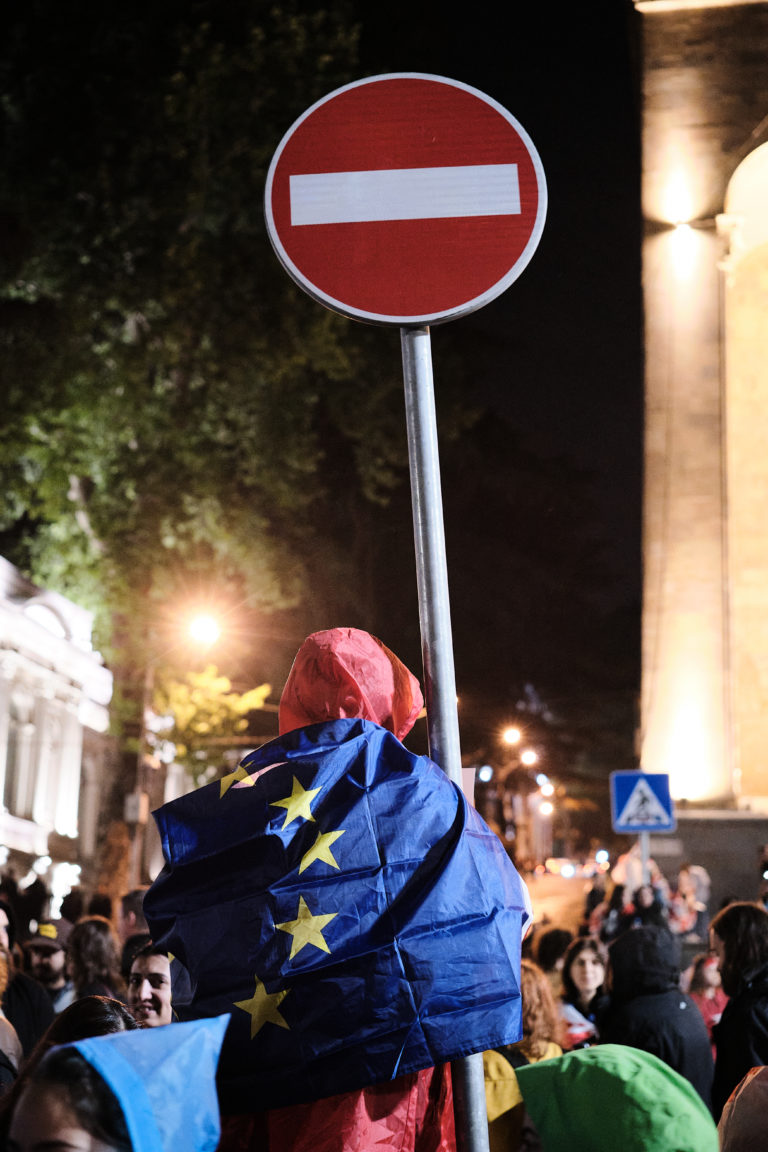
Protest in Tbilisi – © Nik Voigt
In the wake of contentious elections in Georgia and Moldova, two stories of political and cultural resistance emerge, highlighting the fragility of democratic processes in the face of rooted power dynamics. Maradia Tsaava’s account of Georgia’s parliamentary elections reveals a landscape marred by allegations of electoral fraud and authoritarian consolidation, as citizens grapple with disillusionment and systemic oppression. Meanwhile, Vitalie Sprinceana examines Moldova’s presidential election and referendum, illustrating how political interests and cultural divides undermine clear information and marginalise independent voices. Together, these narratives offer a reflection on the challenges of fostering democracy and cultural independence in transitional periods, which these elections represent.
Election Fraud in Georgia: Impotence of Change, Force of Cultural Resistance
Author: Maradia Tsaava
On November 16th, as the Election Administration announced the final results of Georgia’s parliamentary elections, Giorgi Kalandarishvili, the head of the administration, was splashed with black paint directly in his face.
The act, carried out by Davit Kirtadze, a member of the opposition UNM party, was in reference to the election held on October 26th, which have victory to the ruling Georgian Dream party with 53.9% of the vote. A result that the opposition and non-governmental organisations say was brutally rigged.
In addition to serious violations observed at polling stations, such as voter control, bribery, and voting with someone else’s ID, the Georgian Young Voters Association reported that one of the fundamental principles of the right to vote was violated on October 26th: voting was not secret.
“Voter secrecy is a fundamental aspect of the constitutional right to vote, and when this principle is violated, the protection of that right becomes illusory,” GYLA reported and requested annulment of the results from all polling stations.
The Georgian court dismissed the claim, even though the test at one of the court stations revealed that the voter’s mark was visible on the other side of the ballot paper, because the ink has seeped through the paper.
The act of pouring black paint over Kalandarishvili’s face came to symbolise the leaking ink of the parliamentary elections, which NGOs, opposition parties, and thousands of civilians say are not legitimate.
“Our biggest mistake is that we were not expecting this scale of falsification” says Irakli Kupradze, General Secretary of the opposition coalition Strong Georgia. “We considered the new electronic voting system reliable, and we were not ready for absolutely new ways of total falsification. Knowing the limitless immorality of the ruling Georgian Dream party very well, we should have anticipated this.”
The opposition did not plan to enter the parliament and remained outside along with the demonstrators, while on November 25th Georgian Dream held the first assembly to form the parliament, which thousands of people protested against and which President Zourabichvili declared illegitimate. Although the EU has recognised the fraud and some of its representatives have joined the demonstrators in Tbilisi, there has been no official announcement that it will not recognise the legitimacy of the elections, which are seen as a crucial turning point towards either democracy or autocracy.
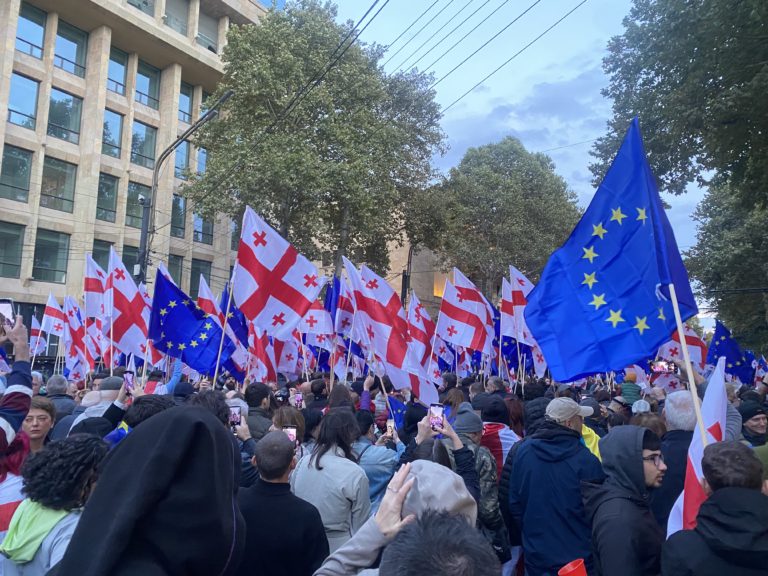
Protest in Tbilisi – © Maradia Tsaava
What Happened?
At 06:15 in the morning, Eka Tsotsoria was already at the polling station, ready to observe the process. A filmmaker by profession, she registered as an observer for the first time in her life.
“Since this election was pivotal for Georgia, I wanted to be part of the process, to have my own observation of it,” Tsotsoria says.
Eka underwent two days of training held by the Georgian Young Voters Association to prepare. This, after a long journey of resistance: boycotting the Georgian National Film Centre in 2023 along with other 450 filmmakers–launching the Georgian Cinema is Under Threat protest movement –, fighting against the privatisation of the Balda Canyon in western Georgia and protesting against recent laws on the streets of Tbilisi. So, becoming an election observer was another step Eka was ready to take.
And she was not an exception: hundreds of civilians from different backgrounds joined the My Vote coalition to observe the elections.
On the election day, the situation seemed rather calm, but the feeling of doubt never left Eka.
“I was observing the process which was calm on the surface, but something else was going on beyond. I was capturing people’s faces for the second, or the third time at the polling station, but the verification machine was validating their identity cards. How could I go against the machine?”
By noon, Eka knew she was observing a process that she couldn’t really change. She remembers a tall, big man at the entrance who never left the place; some people moving around with lists in their hands; a camera recording in the middle of the polling station; the ink leaking on the other side of the ballot paper and was not completely covered by the envelope; observers with some unknown, newly created NGO names on their badges; and finally, the verification machine, which shattered all her confidence and left her with doubts.
“I felt like reality was slipping through my fingers. I was observing a falsification with my own eyes, but I didn’t have actual proof to change anything.”
Although the opposition won her polling station with 58% of the vote, Eka went home defeated and devastated. “I knew we were against the system which was impossible to defeat. Dreaming about fair elections was over.” And the results confirmed her fears. While Edison Research’s exit polls gave Georgian Dream around 42%, the official result was 54%. Since 2012, the difference between Edison Research’s exit polls and the official results has never been more than 2%.
The results outside Georgia were also drastically different. Georgian Dream lost the majority of all polling stations abroad. “The results from outside Georgia are those without propaganda, bribery, and criminal schemes of falsification,” says Kupradze of the Strong Georgia coalition. “After the elections, we found more than 3,000 secret offices mobilising more than 10,000 people involved in the falsification scheme in Georgia. The ID numbers of immigrants who didn’t register for the elections abroad were used here by Georgian Dream.”
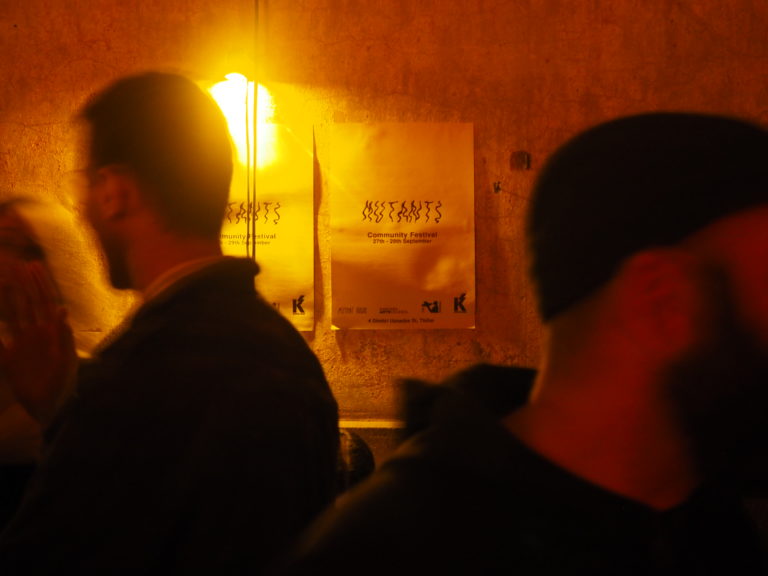
Mutant Festival back in September 2024 in Tbilisi – © Laurent Bigarella
What’s the Future?
Georgia, once seen as the leading country in the region on the road to democracy, now faces long-term isolation in autocracy.
A series of Russian-style laws against international organisations and LGBTQ rights have already caused suspicion in the West and has put Georgia’s EU accession on hold.
Under these circumstances, the parliamentary election of October 26th was seen as crucial for Georgia–either get back on the European track with a multi-party coalition government, or remain under the rule of Georgian Dream for a 4th term and isolate itself from the Western world.
“Unfortunately, Georgia cannot be considered as a role model for anything anymore,” Kupradze says. “Now we are synonymous with human rights violations, autocratic laws, falsified elections, and oligarchy.”
34 years-old writer Iva Pezuashvili is still ready to fight. Boycotting the Writers’ House, which was taken over by the government in 2023, Pezuashvili has been one of the leading members of resistance movements in the cultural sphere. “It’s a super comfortable position to admit defeat to the Russian empire and give up. On October 26th, the Georgian people lost to Russian special forces and this battle was uneven. Autocratic regimes come with elections, but never go with elections.” Pezuashvili is hoping for resistance in the form of street protests and massive boycotts. “After Stalin’s regime, no other power has ever harmed Georgian culture like Georgian Dream did, but still, the phase we are in is a very short period of time in history. And it’s a period when it becomes clear: are we the people who give up when the battle is uneven, or are we the ones who fight for independence to the very end?"
Moldova’s Elections That Surprised and Saddened… Everyone. A Story in Two Episodes
Author: Vitalie Sprinceana
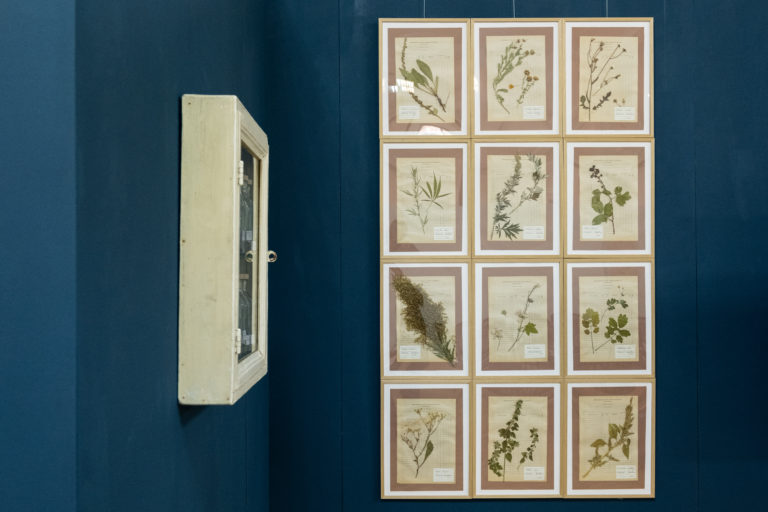
Installation by Lilia Nenescu, seeds from the territory of the former Republican Stadium, from the exhibition Chișinău at the Red Line, November 2024 – © Lucian Spătaru
Episode 1: Politics of Interests
Moldova held two rounds of presidential elections (on October 20th and November 3rd) and a referendum (on October 20th) on European Union integration.
While the elections were to some extent routine–the mandate of President Maia Sandu was due to expire in December this year–the referendum was a completely new experience.
Technically, the referendum was announced on the same day as Maia Sandu’s intention to run for a second term. “I think it is necessary to say clearly which road we–the whole country–choose for Moldova”, said Maia Sandu, immediately asking the people of Moldova to support her presidential bid.
This peculiar timing gave the impression that the whole referendum process was less about the EU integration and more about Maia Sandu’s bid for re-election. This suspicion was confirmed when it was announced that the referendum would be held on the same day as the presidential elections, on October 20th, 2024.
It can be argued that the referendum was confusing, unnecessary, and completely tied to the political interests of one party and her presidential candidate.
First of all, the referendum was not, at least formally, about the EU integration per se, but about a constitutional amendment, which in itself has no impact on the process of European integration and on the technicalities of the EU negotiations (the exact question for the referendum was: “Do you support the amendment of the Constitution with a view to the accession of the Republic of Moldova to the European Union?”).
Second, the referendum was also unnecessary because the process of European integration is already enshrined in Moldovan law (through the Declaration regarding the European Integration of Moldova adopted by the majority of MPs in 2005 and a decision of the Constitutional Court in 2014).
Thirdly, the referendum was also connected to the political agenda of Maia Sandu’s Party of Action and Solidarity (PAS), and its intention to associate Maia Sandu’s image with the process of EU integration. In the end, the referendum passed with a very tiny majority of 50.35%. But these results in no way reflect the preferences of Moldovans towards the EU. Rather, they reflect the Moldovan electorate’s attitude towards Maia Sandu and the PAS, which has governed the country for almost 4 years and has failed to deliver on its promises.
Maia Sandu was also elected after a very nervous second round, but overall there is little reason to celebrate. The main reason is that instead of somehow uniting the country, the referendum has exacerbated some existing divisions and has created some new ones.
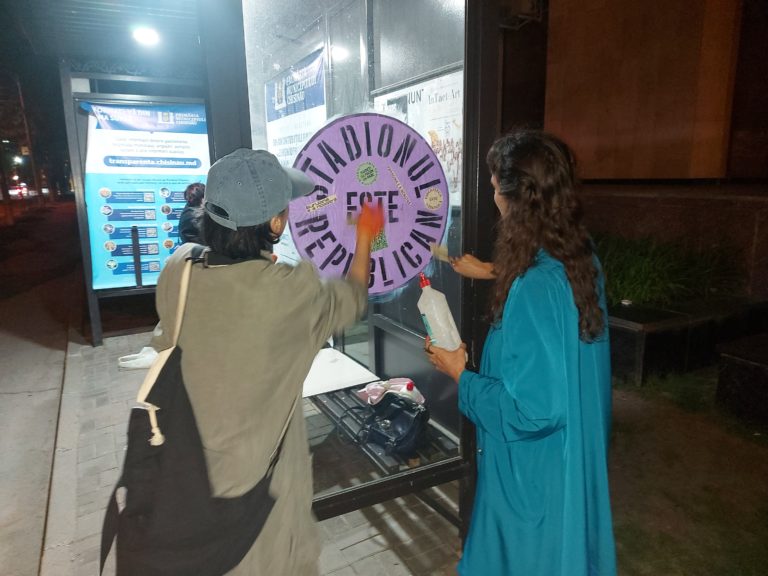
Performance entitled ”Stadionul este Republican” against the selling of the former Republican Stadium in Chișinău – © Vitalie Sprinceana
Episode 2: Culture of Divides
The cultural sector in Moldova has also been divided by this referendum and the presidential elections–along both existing and new lines, with little hope of re-establishing ties or healing wounds.
Let's start with the conventional division into three spheres: the public cultural sector (State institutions at central and local level), the creative industries (commercially oriented cultural entities), and the small but vocal independent cultural sector (comprising activists, NGOs, individual artists and groups).
Traditionally, the State has been responsible for the first, enthusiastically supportive of the second, and completely ignored the third.
A series of neoliberal reforms aimed at restructuring the State, combined with a gradual withdrawal of the State from the cultural sector, meant that the State would try to keep the traditional cultural institutions going, while encouraging new cultural initiatives and groups to look elsewhere for funding and support. The idea that cultural institutions could survive–and possibly thrive–on their own created a fertile ground for the perspective that culture in general should look for ways to be profitable, i.e. to take care of itself. This line of thinking, popular in the Moldovan Ministry of Culture at least since 2009-2010, motivated successive governments to pay excessive attention to the creative industries, which were seen as a model for the development of both the State cultural sector–which was forced to become more profitable–and the independent cultural sector–whose non-profit orientation was seen as an unjustified whim.
The independent cultural sector, whose practices emphasise accessibility, respect for the environment, social responsibility and the involvement of the artists, opposed this logic of the commodification of culture–but with little success.
In 2020-2021, when PAS and Maia Sandu came to power, many people in the independent cultural sector believed that things would change. After all, many people in the sector had been active in causes and struggles that shared many of the same lines as PAS.
Some even saw the new government as a natural ally. The first actions of the new government were reassuring: the approval of the Istanbul Convention (against violence against women and domestic violence, or the reform of the mechanism of State support for NGOs.
At the same time, there were worrying signs: The excessive attention paid by the Ministry of Culture was paying to tourism (to the point that the Minister of Culture inaugurated conferences on medical tourism), the renewed rhetoric about the importance of the creative industries model (which, as it turned out, are not so profitable or sustainable in themselves, judging by the enthusiasm with which organisations in this sector applied for State funding), which suggested that in the area of cultural policy, the current government was continuing the policies of the past rather than breaking with them.
But there was more to come. From 2023, the Ministry of Culture began to behave as a mere appendage of the Presidency and its agenda, becoming the main organiser of cultural events around Maia Sandu’s political agenda. In May 2023, for example, the meeting in support of European integration was organised by the Ministry, which paid more money (4.6 million Moldovan leu) for a glamourous concert than it gave to the entire independent sector in that year (3 million Moldovan leu).
A final blow to hopes of change came this summer, when the independent cultural sector signalled that the space for debate in Moldova was shrinking and censorship was being re-introduced. The case that sparked the debate was the decision by a State theater to cancel a performance that was mildly critical of the President, after receiving a call from the President’s office. When asked to investigate the case, the Minister of Culture preferred to brand the people and organisations raising the issue as “anti-European”.
The three-body part of the cultural sector thus approached the elections and the referendum on two separate tracks. The public cultural sector and the creative industries actively participated in the campaign. In the last days of the campaign, most of the public cultural institutions–may they be orchestras or theaters–and most of the organisations of the creative industries sector expressed their support for Maia Sandu. The independent cultural sector, on the other hand, has been silent and mostly absent from the campaign.
Most of the people in the sector felt uncomfortable with a situation where they had to choose between two equally bad politicians for the sector. Neither Maia Sandu nor her counterpart, Alexandr Stoianoglo, could be considered friends of the independent cultural sector, regardless of their motivations.
The situation has not changed in the weeks since Maia Sandu’s re-election and is unlikely to change in the immediate future.
On the one hand, there will be parliamentary elections in Moldova sometime next year, which will occupy the entire government agenda, leaving little room for culture.
On the other hand, with no changes in the Ministry, there is little hope that things will change in a significant way: For instance, that the government will stop favouring only the creative industries and start working on the things that are important for the sector–the retribution of cultural workers, the law on the status of artists, the unionisation of the sector, and so on.
It appears that, for the time being, the independent cultural sector in Moldova, a small but vocal community, will have to continue the struggle with little or no understanding from the current government.
The elections in Georgia and Moldova expose deep-seated challenges to democracy and cultural autonomy. In both cases, political manipulation and systemic marginalisation have fuelled public discontent, leaving citizens and independent cultural players facing uncertain futures. These struggles underline the urgent need for resistance to safeguard democratic values and cultural diversity in the region.
Published on November 28th, 2024
About the authors:
Maradia Tsaava is a freelance journalist and documentary filmmaker working with different local and international media organisations. She has been writing stories for JAmnews Georgia, Institute for War and Peace Reporting and is the author of two documentary films. Her feature Water Has No Borders was premiered at DOK Leipzig International Competition 2021 and got Human Rights Award at Trento Film Festival. In 2023, Maradia’s short documentary Dreamland won the best short documentary competition at CinéDoc Tbilisi.
Vitalie Sprinceana is a sociologist, cultural journalist, and activist based in Chișinău.